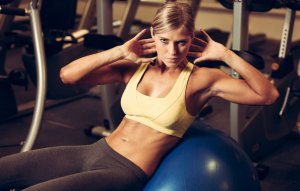Should You Have Breakfast Before Or After Training?

Those who go to the gym in the morning still ask themselves if they should have breakfast before or after training? This is one of the longest debates in the sports and fitness world. There are still opposing opinions today.
It’s not easy to set a position. On one hand, we have the fact that breakfast is the meal that defines your daily energy load. On the other hand, there are disciplines in which it’s preferred to work out first and eat later. Not to mention that this way you don’t have to wait for your body to digest your meal.
Why do some people prefer not to eat before working out?
Until recently this was the trend. Not eating before physical activity prevents digestive problems. Besides that, old-fashioned trainers believe that it’s not necessary to eat because we’ll still have to replenish our energy after training.

Even some scientific postures support this trend. Apparently, for those who want to lose weight, not having breakfast would be the best option. Of course, the subject is more complicated than it seems, not everyone can finish a training session without having eaten.
You might need to ask yourself a few questions. What kind of workout are you doing? Is your body capable of enduring the exercise without the first meal of the day? What are the benefits of skipping breakfast before training? Do you want to gain or lose weight?
Skipping breakfast and training: the negatives
Everything in this scenario would depend on the last meal you ate, this means dinner. And, today, nutritionists advise people to eat a light meal at night. This way, it’s possible to control your weight, tone your muscles, and have a more balanced digestive process.
If we assume this proposition, it’ll be very hard to exercise without any food in the morning. Do we want to gain weight or muscle mass? Not eating breakfast will cause our muscles to degrade, and that’s never good.
Some people won’t even be able to endure an entire exercise session. These people are at risk of losing their progress and desired continuity when they exercise regularly.
Professional athletes: do they eat breakfast before practice?
In the daily diets of high-performance athletes, breakfast has a place before training. Soccer players usually eat toast, coffee, milk, and fruits, while swimmers should at least make an initial liquid intake.

Of course, in professional diets, there’s a fundamental rule: the first meal must be light and balanced. In short, it serves the purpose of providing energy and then, the athlete makes a full food intake for recovery.
Don’t forget that athletes usually have a diet plan including at least 6 meals a day.
The goal of the training
When we exercise, losing weight isn’t our only goal. What we’re mostly looking for is muscle development, working on endurance or even improving performance or scores. Therefore, everything that makes quality possible is better.
And you can only achieve physical quality through good nutrition. Remember the maxim of fitness: we are 70 percent of what we eat and 30 percent of how we exercise. So, having a small meal half an hour before training could make it easier for you to meet your goals.
Of course, the portion should be small, balanced and made up of easy foods to digest. Fruit juices, some simple carbohydrates and maybe a small amount of coffee are the best options. Raisins and nuts are good for giving you energy.
In this respect, it’s always important to consult a nutritionist or trainer. After all, not all workouts and bodies are the same. Perhaps, at some point in the process, you’ll be required to skip breakfast, although that’s not very common anymore.
Breakfast and training definitely don’t have to be opposite poles.
Those who go to the gym in the morning still ask themselves if they should have breakfast before or after training? This is one of the longest debates in the sports and fitness world. There are still opposing opinions today.
It’s not easy to set a position. On one hand, we have the fact that breakfast is the meal that defines your daily energy load. On the other hand, there are disciplines in which it’s preferred to work out first and eat later. Not to mention that this way you don’t have to wait for your body to digest your meal.
Why do some people prefer not to eat before working out?
Until recently this was the trend. Not eating before physical activity prevents digestive problems. Besides that, old-fashioned trainers believe that it’s not necessary to eat because we’ll still have to replenish our energy after training.

Even some scientific postures support this trend. Apparently, for those who want to lose weight, not having breakfast would be the best option. Of course, the subject is more complicated than it seems, not everyone can finish a training session without having eaten.
You might need to ask yourself a few questions. What kind of workout are you doing? Is your body capable of enduring the exercise without the first meal of the day? What are the benefits of skipping breakfast before training? Do you want to gain or lose weight?
Skipping breakfast and training: the negatives
Everything in this scenario would depend on the last meal you ate, this means dinner. And, today, nutritionists advise people to eat a light meal at night. This way, it’s possible to control your weight, tone your muscles, and have a more balanced digestive process.
If we assume this proposition, it’ll be very hard to exercise without any food in the morning. Do we want to gain weight or muscle mass? Not eating breakfast will cause our muscles to degrade, and that’s never good.
Some people won’t even be able to endure an entire exercise session. These people are at risk of losing their progress and desired continuity when they exercise regularly.
Professional athletes: do they eat breakfast before practice?
In the daily diets of high-performance athletes, breakfast has a place before training. Soccer players usually eat toast, coffee, milk, and fruits, while swimmers should at least make an initial liquid intake.

Of course, in professional diets, there’s a fundamental rule: the first meal must be light and balanced. In short, it serves the purpose of providing energy and then, the athlete makes a full food intake for recovery.
Don’t forget that athletes usually have a diet plan including at least 6 meals a day.
The goal of the training
When we exercise, losing weight isn’t our only goal. What we’re mostly looking for is muscle development, working on endurance or even improving performance or scores. Therefore, everything that makes quality possible is better.
And you can only achieve physical quality through good nutrition. Remember the maxim of fitness: we are 70 percent of what we eat and 30 percent of how we exercise. So, having a small meal half an hour before training could make it easier for you to meet your goals.
Of course, the portion should be small, balanced and made up of easy foods to digest. Fruit juices, some simple carbohydrates and maybe a small amount of coffee are the best options. Raisins and nuts are good for giving you energy.
In this respect, it’s always important to consult a nutritionist or trainer. After all, not all workouts and bodies are the same. Perhaps, at some point in the process, you’ll be required to skip breakfast, although that’s not very common anymore.
Breakfast and training definitely don’t have to be opposite poles.
This text is provided for informational purposes only and does not replace consultation with a professional. If in doubt, consult your specialist.








